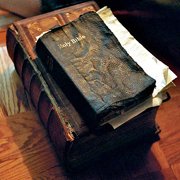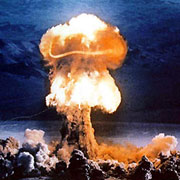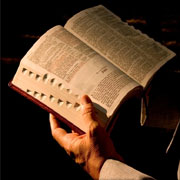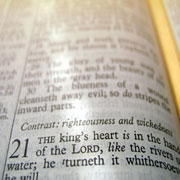

Custom Search
Are we Living in the Last Days...End Times? See Breaking News |
 |
| __________________________ |
 |
________________________ |
| ________________________ |
As You Study the Biblical Last Days in the News... Discover the Bible As Well |
 |
| ________________________ |
 |
| ________________________ |
 |
| ________________________ |
To Know God's Word Read Scripture |
 |
_______________________ |
To Read God's Word Your Reading Schedule |
 |
_______________________ |
 |
| _________________________ |
Thought Provoking Articles for Your Meditation |
 |
_______________________ |
A. The Reign of Solomon, the Temple Built and Dedicated |
|---|
2 Chronicles 1 Solomon's Inauguration
|
2 Chronicles 1:1-13 God appeared to Solomon, offered to grant any wish. Solomon asked for wisdom and knowledge; God granted it. Also gave him wealth, riches, and honor. Tradition has it that Solomon was the greatest of wise men. |
2 Chronicles 1:14-17 Historical evidence is given that that God's promises were fulfilled. Much material wealth verified fulfillment. |
2 Chronicles 2-7 Solomon’s Temple |
2 Chronicles 2 Temple overshadowed all aspects of Israelite life. The Temple was a symbol of God's presence. Rites of atonement brought Israel into reconciliation with God. Solomon needed to organize the labor force. Solomon gets technical assistance from Hiram, King of Tyre. Resident aliens conscripted for forced labor |
2 Chronicles 3 The building of the Temple: The construction is described. |
2 Chronicles 4 Furnishing the Temple: When construction was completed, he deposited all the treasures in the storehouses of the house of God. |
2 Chronicles 5-7 Dedication of the Temple |
2 Chronicles 5 People gathered; Priests brought the Ark. A cloud enveloped the temple: the glory of the Lord filled the temple. God had accepted the Temple and His place in it. |
2 Chronicles 6 The prayers of Solomon: Praised the Lord for his faithfulness to covenant; asked for its preservation. Gave seven concrete examples of need. |
2 Chronicles 7 The Lord responded by sending fire from heaven. The fire was another sign of God's presence, acceptance. |
2 Chronicles 8-9 Solomon’s Kingdom |
Solomon's achievements during his kingdom are listed. Major building programs, shipping revenues were great. Visit from Queen of Sheba is noted. Solomon’s accumulation of much wealth is also noted. Nothing was said about Solomon's many wives and his apostasy. His son, Rehoboam, succeeded Solomon, as king. |
B. The Kingdom of Judah |
2 Chronicles 10-11 Division of the Kingdom |
Rehoboam refused to grant reforms. (The Lord was working to separate the godly in Judah from the ungodly in Israel; therefore north must divide from south). Jeroboam ruled over all Israel (tribes of Judah, Benjamin became south)". Northern tribes were in rebellion against the house of David". Rehoboam was established as king in Jerusalem. Planned to fight against Israel, but the word of the Lord prevented it. All the priests and Levites abandoned Israel and went to Jerusalem. Rehoboam carried out God's will and prospered. Loyalty of military, religious leaders; took many wives, had many sons |
2 Chronicles 12-36 The Rulers of Judah |
2 Chronicles 12 Reign of Rehoboam |
Rehoboam failed to remain loyal to God. After five years, Rehoboam forsook the law of the Lord. He was attacked by Egypt; a quick repentance averted total destruction. He reigned for 17 years; he "did what was wrong". Constant fighting existed between Rehoboam and Jeroboam |
2 Chronicles13 Reign of Abijah |
Matters between Abijah and Jeroboam came to a head in one big battle. Abijah called on people of Israel to affirm God's covenant with David. Condemned Jeroboam's rebellion and apostasy. Despite being outnumbered 2 to 1, Abijah declared, "God is on our side". Pleaded for the unity of all tribes. In battle, northern forces were resoundingly defeated. Abijah lived well with many wives and sons, but died young. Jeroboam never regained his power and "the Lord struck him down". |
2 Chronicles 14-16 Reign of Asa |
2 Chronicles 14-15 Asa did what was right in the eyes of the Lord. He was very prosperous. When threatened by Cushites, he asked for Lord's guidance. Cushites were delivered into his hands, along with much plunder. The prophet, Azariah, affirmed the theme of Chronicles". The Lord is with you while you are with him". Asa responded by instituting great reforms…the end of idols. Worked on temple repairs; had covenantal renewal ceremony. Judah, under Asa, lived in peace for the next twenty years. |
2 Chronicles 16 But then… Asa turned away from the Lord. Israel attacked Judah and Asa turned to king of Damascus for help. Sent treasures to sweeten request; seen as faithlessness against God. Hanani, the seer, rebuked Asa: said he would have wars from then on Asa put Hanani in stocks. The armies of Israel were defeated, but not destroyed. Asa died of gangrene three years later "because he did not seek the Lord". Death by disease was an indication of God's disfavor. |
2 Chronicles 17-20 Reign of Jehoshaphat |
Jehoshaphat did "what was right in the eyes of the Lord". He sent Levites out throughout Judah to teach the law of the Lord. Israel was afraid to attack Judah because of the "dread of the Lord". Many nations brought tribute to him (sign of divine favor). Then he joined forces with Ahab (their children married). Ahab asked for his help in war with Aram. Jehoshaphat asked Ahab to seek the counsel of the Lord. Ahab trotted out 400 prophets who all agreed in predicting victory. Macaiah, another prophet, was brought in who agreed with others. Ahab was suspicious, asked him to tell "truth". Macaiah said God put "a lying spirit in his mouth". Purpose was to entice Ahab into fighting - would be his death. Macaiah was slapped and imprisoned. Ahab and Jehoshaphat went to battle despite Macaiah's warning. Ahab was killed despite attempts to disguise himself. Jehoshaphat came to his senses, prayed to the Lord, and was saved. Jehu (Hanani's son) told Jehoshaphat the same message his father gave to Asa. Jehoshaphat took message to heart, instituted reforms. Installed system of Levitical judges to oversee adherence to law. No longer trial by village, but now under royal officials. Reforms were tested by attacks from south and east (Moab and Ammon). Jehoshaphat led nation in prayer, told to gather army and "watch" Attackers fell on each other; war was averted. Collected the booty, returned home singing the shrines. Allied himself with the king of Israel, not God. Built ships for trade with Tarshish…ships were wrecked. Seen as sign of God's disfavor. |
2 Chronicles 21-23 Three Kings Who "Did Evil in the Eyes of the Lord" |
2 Chronicles 21 The Reign of Jehoram |
Reign of Joram/Jehoram (Married to Ahab's daughter). Eliminated all his younger brothers upon taking the throne. God remained faithful to the covenant he had made with David. Did not destroy the Davidic Kingdom. Edom rebelled against Judah, and prevailed. Elijah (prophet of Israel) prophesied against Jehoram. Prophesied a plague on Jehoram's house and death by disease. Words were fulfilled. |
2 Chronicles 22:1-9 The Reign of Ahaziah |
Also followed the ways of Israel, helped them in. War against Aram is seen. When Jehu was sent to destroy the house of Ahab (northern kingdom), Ahaziah was included in the purge. |
2 Chronicles 22:10-23 The Reign of Athaliah |
Athaliah (Ahab's daughter and mother of Ahaziah) took throne. Son of Ahaziah was very young, hidden by family members. Athaliah would have had him killed. She has no standing to be leader at this moment…not a Judahite. Joash, the son, was hidden in the temple, raised by the high priest. |
2 Chronicles 23 Jehoiada's coup (Jehoiada was high priest raising Joash). When Joash was seven, Jehoiada enlisted help of all priests and Levites. They stationed themselves around the Temple. Jehoiada anointed Joash as king. When Athaliah heard the commotion, she investigated. Athaliah died at the hands of the priests. |
2 Chronicles 24 The Reign of Joash |
2 Chronicles 24:1-14 Divine favor: Jehoiada mentored Joash; Joash repaired the temple. Collection of taxes was made from people for repairs. |
2 Chronicles 24:15-27 Death of Jehoiada and fall of Joash. Joash lost moral courage after death of Jehoiada. Temple was abandoned for idol worship. The prophet, Zechariah (Jehoiada's son), warned Joash. Joash had prophet stoned within temple area great defilement. Judgment came in the form of war with Aram. Joash was wounded, was killed by conspirators to avenge Zechariah. |
2 Chronicles 25 The Reign of Amaziah |
2 Chronicles 25:1-13 He did what was right, but not whole-heartedly. Initially was obedient to the prophetic word. Prepared for war, hired mercenaries from Israel. Nameless prophet told him to forsake men from Israel. Despite having already paid for them, Amaziah obeyed. Amaziah won stunning victory, but mercenaries were upset. |
2 Chronicles 25:14-28 Amaziah brought back gods, set them up. Made threatening overtures towards Israel. King of Israel retorted with a parable about overreaching. Amaziah ignored it and entered a war for which he was not prepared. Israel defeated Judah, brought Amaziah to Jerusalem and took treasures. Amaziah escaped with his life, but lived on the run for 15 years. |
2 Chronicles 26 The Reign of Uzziah |
2 Chronicles 26:1-15 Uzziah under divine favor. Uzziah did what was right in the eyes of the Lord. He prospered. Increased land holdings; surrounding kings paid tribute. |
2 Chronicles 26:16-23 Uzziah's fall from grace. Strength and prosperity led to pride, which led to downfall. Began to usurp the power of the priests and offered sacrifices in the temple; Uzziah was not consecrated to do so. Priests begged him to leave immediately Uzziah ignored them, was stricken with leprosy on the spot. |
2 Chronicles 27 The Reign of Jotham |
He did what was right in the eyes of the Lord. Repaired the temple, fortified the cities, received tribute. Unlike the previous three kings, he stayed the course. |
2 Chronicles 28 The Reign of Ahaz |
He did not do right in the eyes of the Lord. He suffered at the hands of the king of Aram and Israel. Men of Israel captured many Judahites (200,000). Took them back to Israel, but prophet warned Israel about keeping them. Israel had also displeased God, keeping them would bring more guilt. Men of Israel let captives return to Judah…shameful moment for Judah. Ahaz appealed to king of Assyria for help, voluntarily surrendered independence. Instead of helping, King of Assyria (Tiglath-pileser) also oppressed Judah. Ahaz turned to other gods even more and died in disgrace. |
2 Chronicles 29-32 The Reign of Hezekiah |
2 Chronicles 29 Hezekiah did what was right in the eyes of the Lord. Called in the priests and Levites, asked them to help restore the temple. Removed all the idols, pollution, consecrated the house of the Lord. Celebrated with sacrifices, songs, and prayers. |
2 Chronicles 30:1-31:1 Invited north to come celebrate Passover…possible reunification (The north had recently been conquered by Assyria. Hezekiah was reaching out to those who wanted to return to David's kingdom and God's promises. He saw the destruction of the north as a consequence of their apostasy against the Lord. He offered them a second chance). Sent couriers from city to city throughout Israel. Most were met with scorn, but some people made the trip. Passover was celebrated with great fanfare. Extra lambs were sacrificed for those who were ritually unclean. At the end of the Feast, it was extended for another week. "There was great rejoicing in Jerusalem, the like of which had not been known there since the days of Solomon son of David king of Israel." At the end of the festivities, the men of Israel cleansed the land from idols. |
2 Chronicles 31:2-21 Additional reforms by Hezekiah. Set aside the priests and Levites for respective duties in the temple. Provided sacrificial animals out of king's treasury. The livelihood of priests was dependent on people's generosity. People shared too much. Required the building of storehouses. Hezekiah and all the people prospered. |
2 Chronicles 32 Test of Hezekiah |
2 Chronicles 32:1-23 The invasion of the Assyrians. Following death of Sargon I (king of Assyria) Hezekiah buttressed defenses. Sennacherib (king of Assyria) invaded Judah. Put Jerusalem under siege. War of words…tried to intimidate Judeans by mocking God. Called for surrender. Hezekiah paid tribute; siege ended and army returned home. Seen as great victory by the Lord. |
2 Chronicles 32:24-33 Hezekiah's illness. Illness barely mentioned (see 2 Kings 20). Initially Hezekiah was liable to pride, but then submitted to the Lord. Hezekiah was blessed for his religious reforms. |
|
|
© Copyright Nugget Net Review 2013. All rights reserved